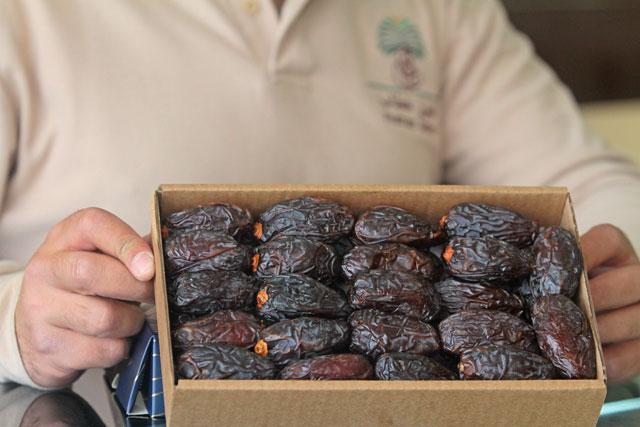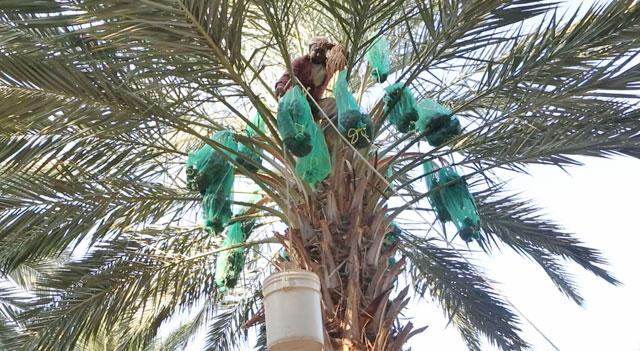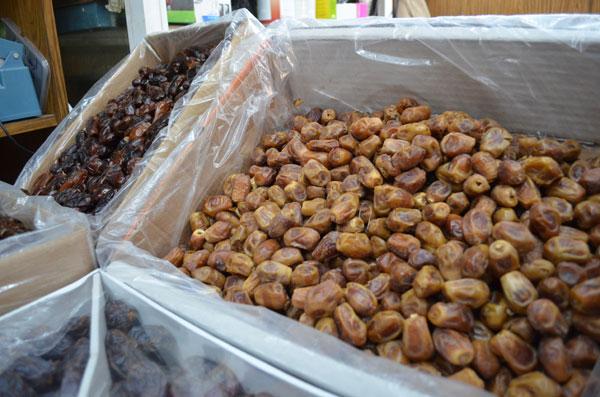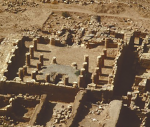You are here
Jordan Valley farmers shifting to high-value date palms
By Hana Namrouqa - Apr 12,2016 - Last updated at Apr 12,2016

A salesman shows medjool dates in a showroom in Amman recently (Photo by Hassan Tamimi)
AMMAN — As international demand for Jordanian date palms is increasing due to high quality, date palm plantations are expanding across the country, officials said on Tuesday.
Growing date palm trees in the Kingdom is a success and the sector has been growing steadily over the past decade, the officials said, noting that Jordanian dates are now strongly competing regionally and internationally.
"Planting certain types of date palms has succeeded in Jordan due to its climate. The Kingdom is now internationally famous for two types of rare date palms; medjool and berhi," Ministry of Agriculture Spokesperson Nimer Haddadin told The Jordan Times.
Date palm farming has been on the rise in the Jordan Valley, Haddadin said, noting that the trend started in the 1990s.
“The terrains planted with date palms in the Jordan Valley are expanding year after year because of the area’s hot weather during summer and its moderate temperatures during winter. In addition, the rich soil of the Jordan Valley makes the area a very good choice to start this kind of farming,” according to the official.
Over the past ten years, a total of 29,000 date palm trees have been planted in the Jordan Valley, according to Adnan Khaddam, president of the Jordan Valley Farmers Union.
He said more farmers are now shifting from growing vegetables to date palm trees due to the high value of this kind of farming. He said such a shift is good news because it eases the over-farming of vegetables, which has increased supplies on the local market and thus affected the income of farmers.
“In addition to the date palms, farmers in the Jordan Valley are now planting more pomegranates and Mexican lemon trees, which yield fruit three times a year,” Khaddam told The Jordan Times.
Across the Kingdom, there are over 30,000 dunums planted with date palms, according to Haddadin, the majority of which are in the Jordan Valley.
“Planting date palms is also famous and successful in Aqaba, Maan, Zarqa and Azraq,” Haddadin highlighted.
A total of 33,000 tonnes of dates are produced each year, Haddadin said, noting that the country annually exports 5,000 tonnes of the fruit, mainly to Europe and the United States.
“The country is particularly famous for its medjool dates, which are highly demanded regionally and internationally. There are more than 300,000 trees of medjool palm dates in Jordan, in addition to 125,000 trees of berhi palms and another 15,000 trees of different types of the palm trees,” Haddadin said.
The official said that the average consumption of palm dates in Jordan is 1.5-2kg per person per year, highlighting the fruit’s richness in nutritional elements, including minerals and vitamins.
However, the official said, small farmers of date palms often suffer from marketing problems because they lack packaging facilities, noting that the ministry plans to help them in addressing such challenges by providing consultations and guidance.
In a step to expand the terrain planted with palm dates and drape vines, and to increase the farms’ competitiveness locally and internationally, the Ministry of Water and Irrigation announced on Sunday that the Jordan Valley Authority was increasing its water allocations for the irrigation of both crops in the Jordan Valley.
The decision was welcomed by the Jordan Farmers Union, which said that the increased water rations would encourage the shift from vegetables to high-value fruit trees in the Jordan Valley.
Related Articles
AMMAN — Plans are under way to set up a company for marketing Jordan’s palm dates, a high-value crop whose cultivation is increasingly expan
AMMAN — Jordan's production of medjool palm dates is expected to grow by nearly fourfold in the coming years to meet surging international d
AMMAN — A recent decision to increase irrigation water for date palms and grape vines will encourage a shift from vegetables to high-value f



















